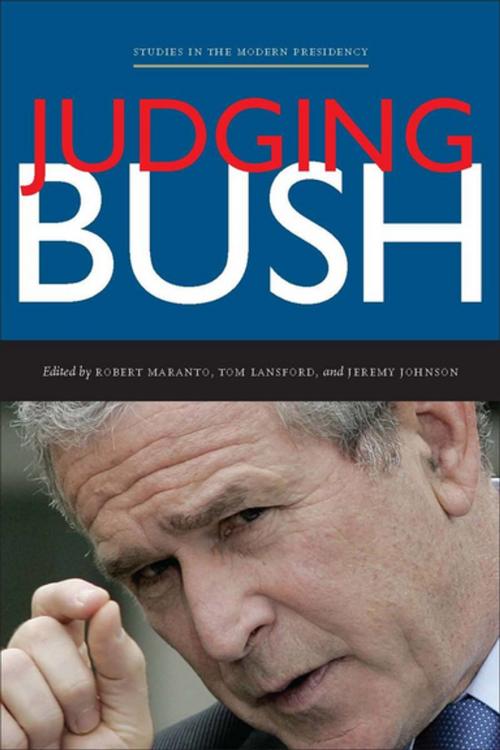| Author: | ISBN: | 9780804772464 | |
| Publisher: | Stanford University Press | Publication: | September 2, 2009 |
| Imprint: | Stanford University Press | Language: | English |
| Author: | |
| ISBN: | 9780804772464 |
| Publisher: | Stanford University Press |
| Publication: | September 2, 2009 |
| Imprint: | Stanford University Press |
| Language: | English |
There is no shortage of opinions on the legacy that George W. Bush will leave as 43rd President of the United States. Recognizing that Bush the Younger has been variously described as dimwitted, opportunistic, innovative, and bold, it would be presumptuous to draw any hard and fast conclusions about how history will view him. Nevertheless, it is well within academia's ability to begin to make preliminary judgments by weighing the evidence we do have and testing assumptions. In the wake of the September 11 terrorist attacks and the initially successful military campaign in Afghanistan, Bush and his administration enjoyed nearly unprecedented popularity. But after failures in Iraq and in the federal government's response to Hurricane Katrina, Bush's approval ratings plummeted. Guided by a new framework, Judging Bush boldly takes steps to evaluate the highs and lows of the Bush legacy according to four types of competence: strategic, political, tactical, and moral. It offers a first look at the man, his domestic and foreign policies, and the executive office's relationship to the legislative and judicial branches from a distinguished and ideologically diverse set of award-winning political scientists and White House veterans. Topics include Bush's decision-making style, the management of the executive branch, the role and influence of Dick Cheney, elections and party realignment, the Bush economy, Hurricane Katrina, No Child Left Behind, and competing treatments of the wars in Iraq and Afghanistan. Contributors include Lara M. Brown, David B. Cohen, Jeffrey E. Cohen, Laura Conley, Jack Covarrubias, John J. DiIulio, Jr., William A. Galston, Frederick M. Hess, Karen M. Hult, Lori A. Johnson, Robert G. Kaufman, Anne M. Khademian, Lawrence J. Korb, Patrick McGuinn, Michael Moreland, Costas Panagopoulos, James P. Pfiffner, Richard E. Redding, Neil Reedy, Andrew Rudalevige, Charles E. Walcott, and Shirley Anne Warshaw.
There is no shortage of opinions on the legacy that George W. Bush will leave as 43rd President of the United States. Recognizing that Bush the Younger has been variously described as dimwitted, opportunistic, innovative, and bold, it would be presumptuous to draw any hard and fast conclusions about how history will view him. Nevertheless, it is well within academia's ability to begin to make preliminary judgments by weighing the evidence we do have and testing assumptions. In the wake of the September 11 terrorist attacks and the initially successful military campaign in Afghanistan, Bush and his administration enjoyed nearly unprecedented popularity. But after failures in Iraq and in the federal government's response to Hurricane Katrina, Bush's approval ratings plummeted. Guided by a new framework, Judging Bush boldly takes steps to evaluate the highs and lows of the Bush legacy according to four types of competence: strategic, political, tactical, and moral. It offers a first look at the man, his domestic and foreign policies, and the executive office's relationship to the legislative and judicial branches from a distinguished and ideologically diverse set of award-winning political scientists and White House veterans. Topics include Bush's decision-making style, the management of the executive branch, the role and influence of Dick Cheney, elections and party realignment, the Bush economy, Hurricane Katrina, No Child Left Behind, and competing treatments of the wars in Iraq and Afghanistan. Contributors include Lara M. Brown, David B. Cohen, Jeffrey E. Cohen, Laura Conley, Jack Covarrubias, John J. DiIulio, Jr., William A. Galston, Frederick M. Hess, Karen M. Hult, Lori A. Johnson, Robert G. Kaufman, Anne M. Khademian, Lawrence J. Korb, Patrick McGuinn, Michael Moreland, Costas Panagopoulos, James P. Pfiffner, Richard E. Redding, Neil Reedy, Andrew Rudalevige, Charles E. Walcott, and Shirley Anne Warshaw.















